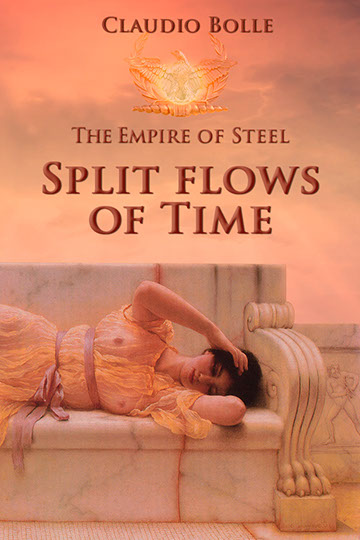

The Empire of Steel
Book One
Split flows of Time
First Italian edition published in June 2016.
First English edition published in March 2022, with the title The Parted River, but because some unwanted problems, in June 2022 I decided to republish it with this new title.
This first book has a diary’s structure and tells us how our main characters, four quite normal people living in 2015, fall prey to a strange phenomenon that takes them to the times of WW2 for a few seconds and then, with the arrival of a truck with three allied soldiers on board, they are all thrown into Tiberius’s Rome.
Events take place in a highly eventful two-week time frame during which the four time travellers – along with the three soldiers – will meet two equally fundamental characters: Emperor Tiberius, a historical figure that is particularly fascinating to me – and his son Drusus. They will then meet additional historical figures, whom I tried to depict consistently with what we know about them. Most of all, the Seven will experience Imperial Rome during one of its peak splendour periods, will participate in social life in palaces, temples, thermal baths and will take us with them on this fantastic journey.
The cover is based on a detail of the picture
“Girl in yellow drapery” (1901)
by John William Godward.
(6” x 9”, pages 388) - Synopsis
A strange cloud in the sky hits a car with four colleagues.
A lightning flash and they find themselves in a different landscape, with an allied military truck about to stop next to them.
Another lightning flash and the landscape changes again.
Our four contemporaries and the three soldiers of World War II will discover that they have arrived in the Rome of Tiberius.
To survive and assert themselves in such a foreign environment they will have to bring out grit, determination and qualities that they did not imagine they possessed.
It will be the beginning of new friendships and new loves and they will be loved, hated, esteemed and fought.
The protagonists are sometimes funny and often transgressive; however, they remain ordinary people, in whom it will be easy to recognize ourselves.
The accurate historical reconstruction will drag the reader into the era in which the Saga takes place, sprinkled with erotica, which gets daring at times.
Of great importance in the Saga is the role of women, who know how to impose themselves, with their sword or their intellect, masters of their own destiny.
The Title
The title for the first book stems from the fact that I have seen time as a large river, split in two separate flows by the arrival of our characters travelling into the past. Scholars support two theories that in time have been dealt with – brilliantly enough – in the best science fiction authors’ works and even in discussions among physicists. Of course so far every discussion has been pure speculation:
- the first theory sees time as a single flow where an event, apparently negligible, modified by an intruder in the past, triggers dramatic disruption in subsequent ages and has repercussions on its perpetrator as well.
- The second theory, that I have adopted for this book, sees time like a large River whose flow is not modified by any agent but where an event – though negligible – triggered by that intruder generates an additional universe, a perfect copy of the first one, as the intruder starts interacting with the surrounding environment.
Hence the title: the great river of times takes two different but parallel directions. In practical terms, this is what turns a possible historical novel into a fantastic adventure.
The issue of language (from the Introduction of the first book)
Our story takes place in Imperial Rome.
Obviously Latin is the spoken language, and only one of the main characters knows it well, because she teaches it in a high school.
The other three Italians have studied it at high school; though not at her same level, they have a good language basis that will emerge as the story unfolds. Others will have to learn it from scratch.
Nobody can speak that language really well, it has been dead for over a thousand years.
There will obviously be some difficulties for everybody; but if you speak – more or less fluently – a foreign language, you know that if there is a will to understand each other, there usually is a communication solution: a turn of phrase or some other system will make it possible to convey your message to your interlocutor.
This attitude usually goes both ways: the person who is speaking his or her mother tongue – in this case, the Roman – will make sure the interlocutor clearly understands what he or she wants to communicate.
If I had dwelt on this aspect, I would have written a “comedy of errors” – a funny one, maybe – but certainly not an adventure book halfway between history and fantasy like this one. I have therefore decided to refrain from hinting to difficulties with Latin, which will be taken for granted.